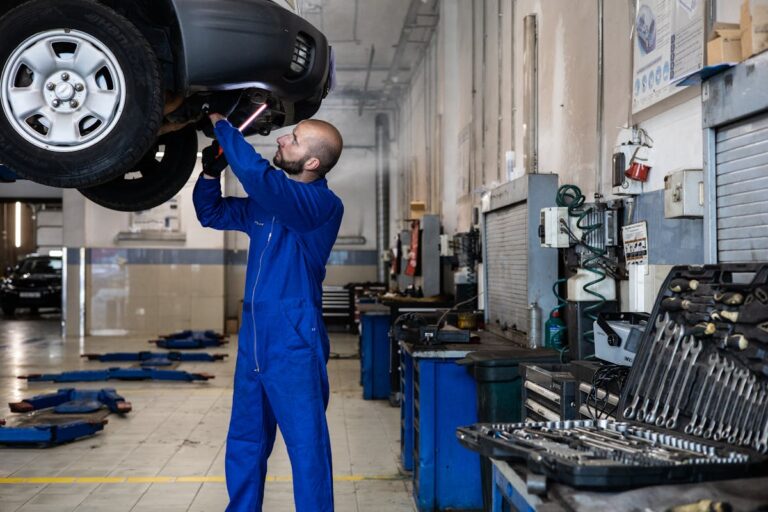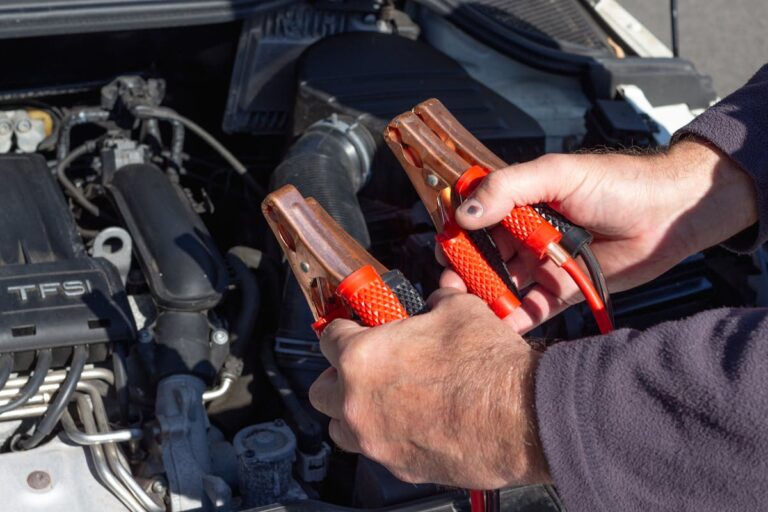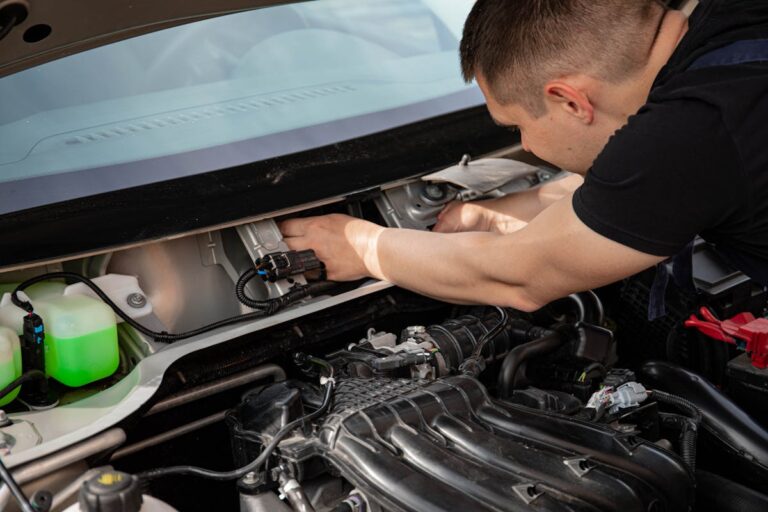The process of selecting an auto shop can often seem intimidating, given the multitude of factors that determine its reliability, honesty, and overall competence. However, this decision is essential as it directly influences the lifespan and performance of your vehicle. A well-chosen auto shop not only guarantees first-rate maintenance and repairs but also instills a sense of trust and satisfaction. So, how do you navigate this process and make an informed decision? Let’s explore this further.
Understanding the Importance of Reliability
Trust, an abstract yet vital element in any business relationship, is particularly significant when dealing with auto shops. The complexity of automotive repairs often leaves customers feeling vulnerable, heightening the need for trust factors such as honesty, transparency, and dependability.
Trust forms the foundation of long-term relationships between auto shops and their clients. When customers trust their mechanic, they are more likely to return for future repairs, increasing customer retention rates and improving the overall success of the business. Additionally, a history of reliability can lead to referrals, thereby expanding the client base.
Transparency is another important trust factor. Auto shops that provide clear, detailed explanations of necessary repairs help customers feel more at ease. This open communication eliminates potential misunderstandings and fosters a sense of respect between both parties.
Lastly, the dependability of the auto shop plays a significant role. Customers need to know that the service provided is consistent, with repairs completed accurately and on time. Inconsistency can quickly erode trust, undermining the potential for a long-term relationship.
Understanding the importance of reliability is the first step in choosing a trustworthy auto shop. Once this is comprehended, customers can make more informed decisions, ensuring their vehicles are in good hands.
Researching Local Auto Shops
When selecting an auto shop, conducting thorough research is an essential step. This process should begin with a detailed list of local auto shops. From this list, you can start exploring each shop’s website or social media pages to get an initial impression of their business. This will provide you with broad insights into the variety of auto shop services they offer, their hours of operation, staff qualifications, and typically, a general pricing structure.
Local shop comparisons are an important part of your research. This step will require a more in-depth look into the specifics of each shop’s services. It would be helpful to create a comparison chart to track important details such as the cost of basic services like oil changes, brake repairs, or tire replacements. Additionally, look for any unique offerings that set a shop apart from its competitors.
While you’re comparing, consider the convenience factor as well. Think about the shop’s location, their available hours, and whether they provide any convenience services like shuttle service or loaner cars. Remember, the goal is to find the best auto shop for your specific needs and circumstances.
Evaluating Auto Shops’ Reputation
Evaluating the reputation of an auto shop is an important part of the selection process. This involves more than just asking for recommendations or checking online reviews. It requires a deeper understanding of the shop’s business ethics, service transparency, and community involvement.
Service transparency is a significant factor in evaluating a shop’s reputation. A reputable auto shop will be upfront about the services they offer, the costs involved, and the estimated completion time. They will not hesitate to explain the technical aspects of their work and how it contributes to the overall performance and longevity of your vehicle.
Community involvement is another vital aspect of a shop’s reputation. A shop that actively participates in local events or supports local causes demonstrates a commitment to the community it serves. It shows that they are not just interested in making a profit, but are also invested in the welfare of their customers and the community at large.
Checking Online Reviews and Ratings
Online reviews and ratings provide an indispensable source of information when choosing an honest auto shop. These evaluations, particularly negative comments, can offer insights into the shop’s reliability, customer service, and quality of work. Trusting top-rated shops is generally advisable, yet one should critically assess these ratings to guarantee their authenticity and relevance to your specific needs.
Importance of Online Ratings
A staggering majority of consumers today turn to online reviews and ratings before making the decision on where to get their car fixed. This trend underlines the importance of online ratings in shaping consumer behavior and choices. Online platforms have become the go-to source for people seeking reliable auto shops, as they offer a wealth of customer feedback, which is an invaluable tool in evaluating the reputation and reliability of a business.
Customer feedback on these online platforms serves as an indication of the auto shop’s quality of service, honesty, and reliability. Positive reviews can greatly enhance the shop’s credibility, attracting more potential customers. On the other hand, poor ratings can deter potential customers, causing a dip in business for the auto shop.
Moreover, high online ratings can also influence the shop’s ranking on search engines, thereby increasing their visibility to potential customers. Hence, maintaining high online ratings is not only essential for retaining current customers but also attracting new ones.
Analyzing Negative Comments
While high online ratings can considerably boost an auto shop’s reputation and visibility, it is equally important to pay attention to negative comments or lower ratings when evaluating the credibility of an auto shop. Negative feedback analysis plays an essential role in this process, providing valuable insights into the customer experience and highlighting areas for improvement.
In some cases, a recurrent negative comment may indicate a persistent problem. This could range from poor customer service, overpriced services, to longer wait times. On the other hand, a one-off negative comment may be an isolated incident rather than a systematic issue. In both scenarios, the way the auto shop responds to these comments can provide further insights. A prompt and professional response demonstrates a commitment to customer satisfaction and a willingness to improve.
Moreover, negative comments can also help discern the authenticity of the reviews. An auto shop with only positive reviews could raise suspicion of manipulated or fabricated feedback, while a mix of positive and negative reviews tends to present a more realistic picture of the customer experience. Consequently, analyzing negative comments is an essential component in evaluating an auto shop’s credibility.
Trusting Top-Rated Shops
Finding your way through the plethora of auto shops can be intimidating, but turning to top-rated ones often simplifies the process. Online reviews and ratings have a profound influence in shaping customer decisions, and more often than not, they act as significant trust factors. These ratings, usually on a scale from one to five, represent the majority’s opinion about a particular shop’s performance.
The higher the rating, the greater the trust factor, as it generally indicates that the shop has satisfied the needs of its customers. However, it is essential to investigate deeper and read the reviews themselves. They often provide insight into the shop transparency, detailing the quality of service, the fairness of prices, and the professionalism of the staff.
Asking for Recommendations
In your quest for an honest auto shop, seeking recommendations from trusted sources can be an invaluable step. Recommendations can come from various channels and can considerably reduce the time and stress involved in finding a reputable service provider.
One effective means of gathering recommendations is leveraging networking opportunities. These could be in the form of social gatherings, workplace discussions, or community meetings. People usually have personal experiences with auto shops and can provide first-hand information based on their encounters. They can point you in the direction of trustworthy auto shops, thereby reducing the risk of falling victim to unscrupulous service providers.
Online platforms also offer valuable portals for obtaining recommendations. Community forums, for instance, can host a wealth of information. Participants often share their experiences, giving you an insight into the quality of service provided by various auto shops. These platforms also offer a space for asking questions and engaging in discussions that can lead to finding an honest, reliable auto shop.
Inspecting Certifications and Accreditations
A thorough understanding of auto shop certifications is essential when choosing a reliable service provider. Equally important is the shop’s accreditation status, which serves as proof of its adherence to industry standards and quality workmanship. Finally, be sure to verify the authenticity of these credentials, as this can help you distinguish between honest auto shops and those that may not be as trustworthy.
Understanding Auto Shop Certifications
Steering through the world of auto shop certifications can seem complex, but it is an essential part of ensuring you choose an honest and competent service provider.
There are various certification types, each having its own set of industry standards. Some of the most recognized include ASE (Automotive Service Excellence), ATRA (Automatic Transmission Rebuilders Association), and I-CAR (Inter-Industry Conference on Auto Collision Repair) certifications. ASE certification is perhaps the most common, with tests covering a wide range of automotive repair and service specialties.
ATRA certification, on the other hand, focuses on transmission repair and service, while I-CAR certification is geared towards collision repair. Each of these certifications requires passing rigorous tests and meeting specific industry standards, which vary depending on the specific certification in question.
When choosing an auto shop, it’s important to ask about their technicians’ certifications. This information will give you an insight into their expertise, knowledge, and commitment to quality service. Remember, a certified shop is not only likely to provide superior service but also adhere to ethical business practices. In the end, understanding auto shop certifications can make the difference between a satisfactory and unsatisfactory repair experience.
Importance of Shop Accreditations
Recognizing the prominence of shop accreditations is an essential step in choosing a reliable auto repair provider. An accredited auto shop has met specific industry standards and demonstrates a commitment to quality workmanship and customer service. Shop certifications often serve as an additional layer of comfort and dependability for customers, guaranteeing them that their vehicle is being serviced by trained, knowledgeable, and competent professionals.
Shop accreditations offer numerous benefits. For one, they provide a benchmark for the level of service and expertise you can expect from an auto repair provider. They also confirm that the shop adheres to ethical business practices, such as providing accurate estimates, using quality parts, and standing by their work.
Moreover, accreditation benefits extend to a shop’s employees as well. Certified technicians are often more knowledgeable and up-to-date on the latest repair techniques and technologies. This means they can quickly diagnose and fix issues, reducing downtime and potentially saving you money in the long run.
Verifying Legitimate Credentials
Even though an auto shop may claim to have various certifications and accreditations, it is vital to verify these credentials to confirm their legitimacy. Credential verification is a significant step when choosing an auto shop, as it guarantees the shop’s proficiency, professionalism, and adherence to industry standards.
To verify credentials, ask the shop to provide copies of their certifications and accreditations. Legitimate documentation should contain clear information about the issuing bodies. Remarkable accreditation bodies include Automotive Service Excellence (ASE), the National Institute for Automotive Service Excellence, and Inter-Industry Conference on Auto Collision Repair (I-CAR). Certifications from these organizations indicate that the shop meets or exceeds industry standards in various areas, such as customer service, technical knowledge, and business ethics.
You can also verify the shop’s credentials online. Most accreditation bodies have websites where you can search for accredited businesses. If the shop’s name appears in the search results, their credentials are valid. If not, the shop may be falsely claiming to have these credentials.
Comparing Pricing and Service Quality
How does one go about comparing the pricing and service quality of different auto shops?
Firstly, it’s vital to focus on pricing transparency. This is an indication of an auto shop’s honesty and straightforwardness. Pricing transparency involves providing customers with detailed, itemized quotes before work begins. It rules out the possibility of hidden charges cropping up later. If an auto shop is hesitant to provide a clear quote, it might be a sign of unreliability.
Secondly, examine the service guarantees offered. Reliable auto shops will stand behind their work, offering warranties or guarantees to guarantee customer satisfaction. These can range from parts and labor warranties to full service guarantees. The duration and terms of these guarantees can provide insight into both the quality of work and the shop’s commitment to customer satisfaction.
Then, to compare service quality, consider the shop’s reputation. Check independent review platforms and speak to past customers. Remember, a higher price doesn’t always equate to better service.
Assessing Customer Service Standards
A notable factor when choosing a trustworthy auto shop is evaluating their customer service standards. These standards, often reflected in the quality of customer interaction, can greatly impact your overall experience.
An auto shop with high customer service standards will have knowledgeable, friendly, and accessible staff. They should be able to answer your queries and communicate effectively about the services needed for your vehicle. Furthermore, they should be willing to explain technical issues in layman’s terms, making sure that you understand what work is being done.
Service follow-up is a further sign of excellent customer service standards. A reputable shop will not only guarantee that your vehicle has been serviced correctly, but they will also follow up to confirm your satisfaction. They might do this through a phone call or email, asking if the vehicle is running smoothly or if there are any concerns after the service.
Additionally, online reviews and ratings can provide insight into a shop’s customer service standards. Look for positive comments about staff responsiveness, communication, and follow-up. Remember, a shop with high customer service standards will prioritize your satisfaction, guaranteeing a positive relationship for all future dealings.
Making the Final Decision
After evaluating customer service standards, the final step is making the decision about which auto shop to select. This involves carefully finalizing your choice based on the research and firsthand experiences you’ve gathered. Consider the overall service quality, the shop’s reputation, and the trustworthiness of the mechanics.
While making your final selection, it’s essential to remember that price should not be the sole determining factor. Instead, consider the value offered by the auto shop. Does the cost match the services rendered? Are the mechanics certified and experienced? Will they use high-quality parts for repairs? These are all critical aspects to take into account.
Also, considering convenience is key. The location of the auto shop should be easily accessible to you. Check their hours of operation to guarantee they align with your schedule. Some auto shops also offer additional services such as shuttle service or loaner cars, which can be a deciding factor if you need to leave your vehicle for an extended period.
Frequently Asked Questions
Does the Auto Shop Offer Any Warranty on Their Repair Services?
Yes, the auto shop provides extensive warranty coverage on their repair services. This service guarantees the quality and durability of repairs, ensuring customer satisfaction and peace of mind with each transaction.
What Are Some Common Signs of an Unreliable Auto Shop?
Common signs of an unreliable auto shop include consistent poor customer service, lack of transparency in pricing or services, excessive delays in repair time, and a high number of unresolved customer complaints or negative reviews.
What Kind of Training Do the Auto Shops Mechanics Have?
Qualified auto shops employ mechanics with professional certifications and promote ongoing education to guarantee up-to-date knowledge on vehicular advancements. This training ensures proficient and reliable service for diverse car models and complex mechanical issues.
Are There Specific Auto Brands That the Shop Specializes In?
Yes, the auto shop specializes in specific brands, enhancing its brand expertise. This specialization guarantees high service quality, as the mechanics are trained and experienced in dealing with particular makes and models of vehicles.
How Does an Auto Shop Handle Disputes or Complaints From Customers?
An exceptional auto shop prioritizes customer feedback, swiftly addressing disputes or complaints through a thorough resolution process. This often involves open communication, understanding the issue, and delivering appropriate rectifications to maintain high levels of customer satisfaction.





